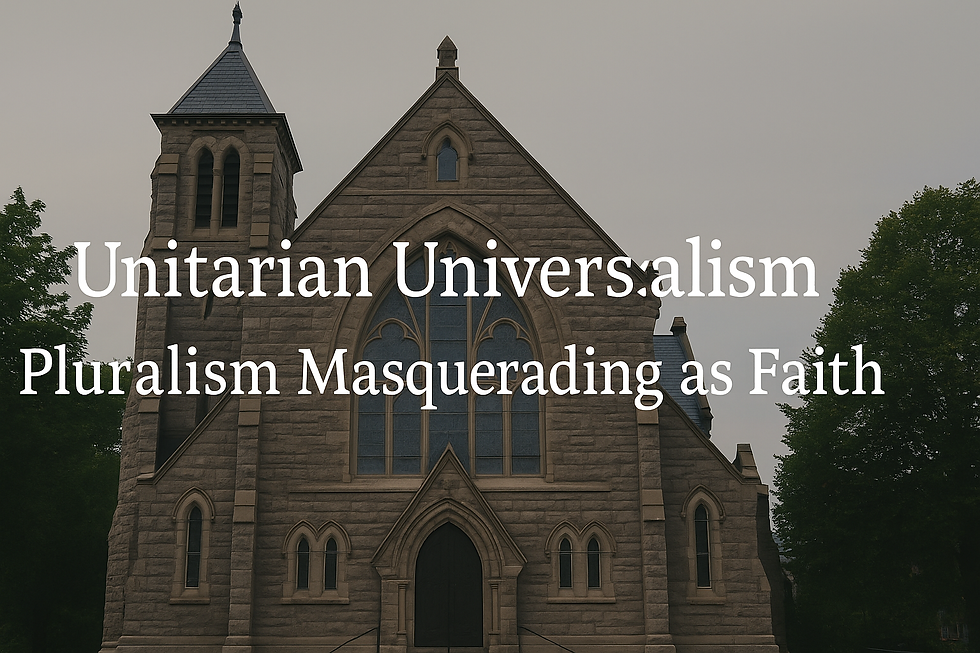Unitarian Universalism: Pluralism Masquerading as Faith
- Bible Believing Christian

- Aug 19, 2025
- 4 min read

Unitarian Universalism: Pluralism Masquerading as Faith
Unitarian Universalism (UU) is often mistaken by outsiders as another Christian denomination. In reality, it is neither Christian nor even a theistic religion in the historic sense. What began as two fringe Christian heresies — Unitarianism (denial of the Trinity) and Universalism (denial of eternal judgment) — has merged into a broad pluralistic movement that welcomes atheists, pagans, Buddhists, humanists, and anyone else seeking “spiritual community.”
While UU presents itself as compassionate, tolerant, and modern, it empties Christianity of its substance. By denying Christ’s deity, the authority of Scripture, and the exclusivity of salvation in Him, Unitarian Universalism becomes yet another false gospel.
“Jesus said to him, ‘I am the way, and the truth, and the life; no one comes to the Father except through Me.’” (John 14:6, NASB)
History
Unitarianism: Arising during the Reformation and Enlightenment eras, Unitarianism rejected the Trinity and insisted God is one person only. In the U.S., Unitarians were influential in New England during the 18th–19th centuries, with leaders such as William Ellery Channing trying to maintain a “Christian” identity while denying Christ’s deity.
Universalism: Developing alongside, Universalism taught that a loving God would never condemn anyone eternally, and that all would eventually be saved.
Merger in 1961: The Unitarian Universalist Association (UUA) was formally established by merging the two. This signaled a full abandonment of historic Christianity in favor of theological pluralism.
Current Profile: Today, fewer than 200,000 members remain in UUA churches in the U.S., and numbers continue to decline. Many congregations no longer even call themselves Christian — they openly affirm atheists, pagans, humanists, and people of every possible belief system.
Core Beliefs & Distinctives
No Trinity
UU rejects the biblical doctrine of Father, Son, and Holy Spirit as one God in three Persons. Jesus is reduced to a moral teacher, not the eternal Son of God.
Universal Salvation
All people, regardless of faith in Christ, are considered destined for reconciliation. This nullifies the warnings of Scripture:
“These will pay the penalty of eternal destruction, away from the presence of the Lord and from the glory of His power.” (2 Thessalonians 1:9, NASB)
Pluralism Over Truth
UU promotes “no creed but love,” allowing all religious ideas to be valid. In practice, this makes Scripture optional and often dismissed.
Human-Centered Religion
Salvation is unnecessary in UU thought because people are seen as inherently good. The focus shifts from redemption in Christ to self-improvement, activism, and social justice.
Scripture Relegated
The Bible may be read in UU churches, but it is treated as one among many “wisdom texts,” alongside poetry, world religions, or humanist philosophy. Its divine authority is rejected.
Strengths
Social Engagement: UU congregations are often at the forefront of humanitarian and justice initiatives.
Community for the Disillusioned: Provides belonging for those who distrust organized religion.
Serious Moral Intent: Promotes values of inclusivity, tolerance, and ethical living.
These strengths, however, rest on a foundation of theological compromise. Social good without gospel truth is a counterfeit.
What They Get Wrong Biblically
Christ’s Deity Denied
“For in Him all the fullness of Deity dwells in bodily form.”(Colossians 2:9, NASB)
UU strips Jesus of His divinity, ignoring clear Scripture.
Universalism vs. Judgment
“And just as it is destined for people to die once, and after this comes judgment.”(Hebrews 9:27, NASB)
UU denies God’s justice in favor of sentimentalism.
Pluralism vs. Exclusivity of Christ
“And there is salvation in no one else; for there is no other name under heaven that has been given among mankind by which we must be saved.” (Acts 4:12, NASB)
UU’s “many paths to God” is a direct contradiction.
Scripture Rejected
“All Scripture is inspired by God and beneficial for teaching, for rebuke, for correction, for training in righteousness.” (2 Timothy 3:16, NASB)
UU places human conscience over God’s Word.
Strange & False Teachings
Atheism Within a “Church” — Many UU members are open atheists, which highlights how far the movement has drifted from Christianity.
Pagan and New Age Influence — UU congregations often incorporate Wiccan rituals, Buddhist meditation, or pantheistic elements.
Moral Relativism — By making all beliefs equally valid, UU undermines the very idea of truth.
Myths to Refute
“UU is a Christian denomination.”
False. It openly rejects the gospel, Christ’s deity, and biblical authority.
“It’s just about love.”
Real love speaks truth. UU offers sentimentality without salvation.
“It’s open-minded Christianity.”
No — it is post-Christian pluralism that has abandoned the faith once delivered to the saints (Jude 1:3).
Pastoral Path Forward
Unitarian Universalism is attractive because it removes the offense of the cross. It offers belonging without repentance, spirituality without truth, and morality without salvation. But in removing judgment, it also removes forgiveness.
Christians must be clear: pluralism is not the gospel. True love does not affirm lies but calls people to the truth of Christ, who alone saves.
“Therefore I said to you that you will die in your sins; for unless you believe that I am, you will die in your sins.” (John 8:24, NASB)
Why Denominations Are Unbiblical
UU is not even a denomination but an illustration of how divisions and heresies spiral out of control. Paul warned the Corinthians against dividing into sects (1 Corinthians 1:12–13). How much worse when an entire movement divides away from Christ Himself?
Denominations fracture the body; Unitarian Universalism abandons it entirely. Both prove why sectarianism is dangerous and unbiblical.


